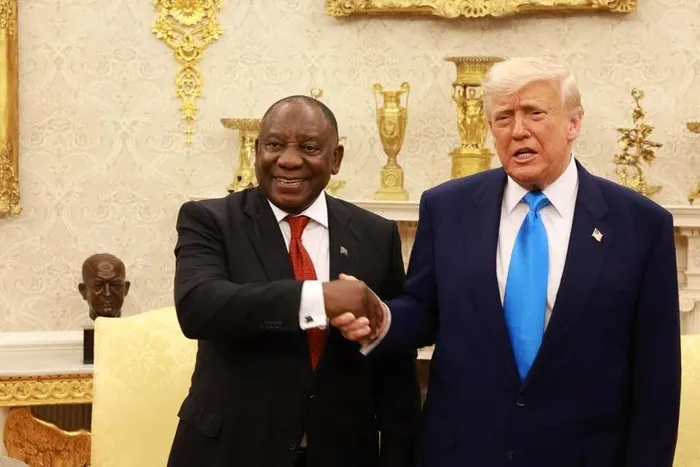Fears of 30% tariffs loom as US-South Africa trade negotiations remain unresolved
TRADE

Economists and other experts say that there is some concern following the expiry of US President Donald Trump’s 90-day pause on tariff hikes on South Africa and other countries announced on Liberation Day in April. South Africa faces up to 30% tariffs if implemented.
Image: GCIS
As July 9 approaches, economists and industry experts have expressed serious concern about the potential consequences of the expiry of US President Donald Trump’s 90-day pause on tariff increases affecting South Africa and other countries.
Following the promise of a 10% universal tariff, there is a looming threat of substantial tariffs rising to an alarming 30% if a deal is not reached by the impending deadline. This situation sends ripples of uncertainty among South African exporters who rely heavily on the US market for their products.
Wandile Sihlobo, chief economist at Agricultural Business Chamber of South Africa, on Thursday highlighted the ongoing negotiations between South African businesses and US authorities but noted the prevailing ambiguity regarding future trade terms.
“South African businesses and the government have engaged, and continue to interact with US authorities regarding the path forward. However, the path forward remains unclear at this moment, although we would all like to see the continuation of the 10% tariffs rather than the 31% tariffs South Africa faced,” he said.
“The export diversification part is, of course, sound advice. However, we cannot completely abandon the US market; it is vital to South Africa and crucial to us in the agricultural sector. The export diversification comments typically point to China, suggesting that we should focus more on that area. Indeed, regular readers of this letter will be aware that China has been a primary focus for some time.”
Professor Raymond Parsons, an economist from North West University, said that this was another period of heightened uncertainty for key SA exporters to the US.
“Unless a US-SA deal is struck by then, or the deadline is extended, the immediate economic worry is about the impending rise in reciprocal tariffs. About 80% of all products exported to the US by SA will get the full impact of the 30% reciprocal tariff increase,” he said.
“We must therefore not underestimate how crucial the current dialogue between the US and SA is for future trade and investment relations. This also needs to cover the future of Agoa. SA needs to buy time to stabilise and consolidate its US-SA economic relations.”
Annabel Bishop, chief economist at Investec, however suggested that there might be extensions on negotiations for various US trade partners that could mitigate imminent tariff hikes.
“Substantial progress made in negotiations with most of the US’s major trade partners has reduced global economic growth concerns, with time expected to be extended past next week for those still ‘negotiating in good faith’. A number of key US trade partners have not had smooth sailing with their negotiations, with the biggest, the EU trade bloc, set to face tariffs up to 50% if it does not come up with a deal the Trump administration finds suitable,” Bishop said.
“However, should the period not be extended for negotiations for key trade partners, this would have a negative impact on the growth outlook.”
University of KwaZulu-Natal academic and political analyst Siyabonga Ntombela, encouraged a focus on bolstering the South African economy itself, suggesting that any negative impacts from tariff hikes would also have repercussions for US companies operating in the country.
“The government should focus on growing the South African economy and not worry too much about US-imposed tariff hikes. Remember, there are more than 600 US companies in SA that stand to benefit from a healthy and functioning economy, so anything that will cripple the South African economy will have a direct and adverse impact on these companies too,” Ntombela said.
Professor Bonke Dumisa, an independent economic analyst, said that the pause announced by Trump initially worked positively.
“However, it is now a well-accepted fact that Trump's tariff wars have failed; many countries are no longer scared of them. Hence, I do not think any additional days or weeks will make a positive impact. It is precisely for this reason that the USA did not publicly disclose the contents of their international agreement with China,” Dumisa said.
BUSINESS REPORT
https://businessreport.co.za/